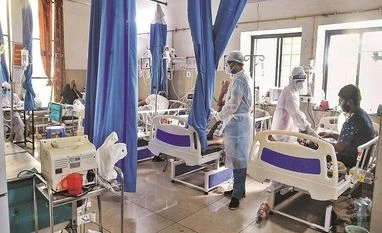At least 18,000 ICU beds and 28,000 oxygen beds will be required for COVID-19 patients if the daily cases rise up to one lakh in the national capital, according to Delhi government estimates.
Hospitalisation or institutional support will be required in only five per cent of COVID-19 cases when the daily cases will reach the one-lakh mark. While 4,000 of them will require oxygen beds, the number of patients requiring ICU beds will be 1000, as per the estimates.
The projected estimates were shared by the government in a meeting of the Delhi Disaster Management Authority (DDMA) on Monday to review the preparedness and conditions during the third wave driven by the Omicron variant of coronavirus.
The SUTRA' model by IIT scientists had predicted that the COVID-19 peak in Delhi will be around January 15 and the national capital can record around 70,000 cases daily during that time.
The number of ICU beds required to manage the surge will be 18,000, while that of oxygen beds will be 28,000 with the average length of stay being 18 and seven days, respectively, according to the estimates.
A total of 46,000 hospital beds will be required during the surge, the official figures stated.
More From This Section
The government said it targets to have 37,000 Covid beds ready besides 10,594 ICU beds and 2,328 paediatric beds.
As on January 10, 31,695 COVID-19 beds are ready while the number of ICU beds and paediatric beds ready is 9,844 and 2,328, respectively, as per the figures.
On Sunday, Delhi reported 17 deaths due to Covid, the highest in a day since June 13 last year.
The capital has logged 53 COVID-19 deaths so far this month. A total of 54 fatalities due to the viral disease were recorded in the last five months -- nine in December, seven in November, four in October, five in September and 29 in August.
Chief Minister Arvind Kejriwal said the pace of the contagion in the city has been a matter of "deep concern" but maintained that there is no plan to impose a lockdown for now and urged people to follow Covid-appropriate behaviour as well as get themselves vaccinated.
)